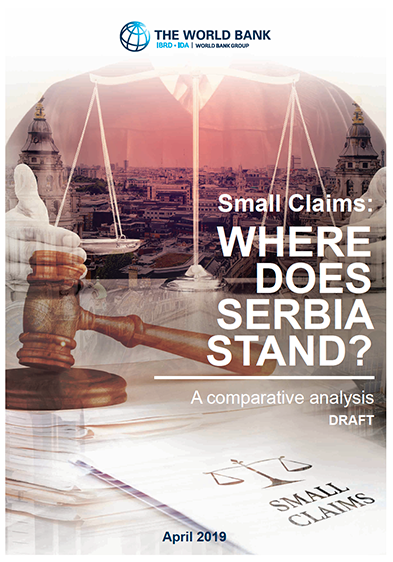 Serbia Judicial Functional Review of 2014 recommends streamlining the procedure for small claims with a view to its acceleration as one of the measures for improvement of overall country’s judicial system performance. To support Serbian authorities in designing reforms the MDTF JSS prepared Report Small Claims – Where Does Serbia Stand? to provide recommendations for the optimization of the procedure for resolving small claims in Serbia based on the comparative analysis with other jurisdictions.
Serbia Judicial Functional Review of 2014 recommends streamlining the procedure for small claims with a view to its acceleration as one of the measures for improvement of overall country’s judicial system performance. To support Serbian authorities in designing reforms the MDTF JSS prepared Report Small Claims – Where Does Serbia Stand? to provide recommendations for the optimization of the procedure for resolving small claims in Serbia based on the comparative analysis with other jurisdictions.
The Report examines how the procedure for resolving small civil and commercial claims is regulated in the law and implemented in the court practice of six European Union jurisdictions (Austria, Denmark, Estonia, Germany, Latvia and Slovenia). It then compares that to the small claims procedure in Serbia. The aim of the Report is to outline and examine critically the types of simplifications used in comparator jurisdictions and discuss which ones bring about the greatest gains in terms of reducing the length and cost of the procedures and could be appropriate for the Serbian context.
The report follows the development of a typical small claims procedure exploring its elements such as threshold below which the procedure is applicable; fees; filing the claim; collection of evidence including the level of initiative admissible for judges in adversarial systems; preparation of the case; hearings; timelines; judgement; grounds for appeal; fees for appeal; rules for the appellate court; and the potential of alternative dispute resolution in small claims. Finally, the report presents its conclusions and recommendations.
The level of the threshold in Serbia is unusually high, especially for commercial claims. Therefore, the scope of the small claims procedure is extremely broad. At the same time, judges lack of discretion on whether to apply the simplified procedure or not regardless of the complexity of the case. There are two main consequences: (1) judges may have to decide a complex case with a relatively high value under the simplified rules thus not giving it sufficient attention; and (2) further simplifications to the procedure can be very hard to accept, given the broad category of cases that would be affected.
Recommendation:
Introduce a well-structured preparatory written phase in small value cases with short timelines and an obligation that parties should present/request all evidence that is available to them during that phase. Such written phase could be used to determine whether a hearing shall be conducted at all or the case could be resolved in a written-only procedure.
Finding:
Recommendation:
If fees are very high, this can hinder access to justice. In Serbia, fees for small commercial claims with a high value are the highest among comparator jurisdictions.
Тhe court fee structure of Serbia may encourage frivolous litigation, charge commercial entities excessively and increase the administrative burden of courts and enforcement authorities.
Introduce a single fee per court instance payable at the outset of the procedure.